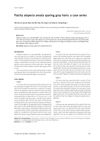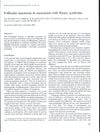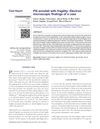 January 2018 in “Elsevier eBooks”
January 2018 in “Elsevier eBooks” The document concludes that alopecia has significant social and psychological effects, leading to a market for hair loss treatments.
 58 citations,
January 2018 in “International Journal of Women's Dermatology”
58 citations,
January 2018 in “International Journal of Women's Dermatology” Alopecia significantly lowers women's quality of life, with psychological and social challenges, highlighting the importance of early treatment and support.
 8 citations,
October 2021 in “Indian Journal of Plastic Surgery/Indian journal of plastic surgery”
8 citations,
October 2021 in “Indian Journal of Plastic Surgery/Indian journal of plastic surgery” Hair transplants are mostly safe but can have minor complications.
 13 citations,
January 2014 in “Postępy Dermatologii i Alergologii”
13 citations,
January 2014 in “Postępy Dermatologii i Alergologii” Patchy alopecia areata can affect only pigmented hairs, leaving gray hairs untouched.
3 citations,
January 2021 in “Oxidative Medicine and Cellular Longevity” Nrf-2-modified stem cells from hair follicles significantly improve ulcerative colitis in rats.
 12 citations,
August 2016 in “Current opinion in genetics & development”
12 citations,
August 2016 in “Current opinion in genetics & development” Organs like hair follicles can renew themselves in complex ways, adapting to different needs and environments.
 5 citations,
October 2022 in “Frontiers in bioengineering and biotechnology”
5 citations,
October 2022 in “Frontiers in bioengineering and biotechnology” Ro stress hindered ginseng root growth and ginsenoside production, but increased certain hormones and affected gene regulation related to plant growth and stress responses.
4 citations,
June 2023 in “Frontiers in immunology” JAK inhibitors help hair regrowth in alopecia areata but have a high risk of side effects.
May 2023 in “Pharmaceuticals” Three specific mutations in the LIPH gene can cause hair loss by damaging the protein's structure and function.
 90 citations,
June 2006 in “The American Journal of Dermatopathology”
90 citations,
June 2006 in “The American Journal of Dermatopathology” The document concludes that accurate diagnosis of different types of hair loss requires careful examination of hair and scalp tissue, considering both clinical and microscopic features.
 228 citations,
February 2003 in “Urology”
228 citations,
February 2003 in “Urology” Androgen deprivation therapy for prostate cancer can cause sexual, physical, and psychological side effects, and doctors should manage these carefully.
 3 citations,
October 1993 in “The Journal of Dermatology”
3 citations,
October 1993 in “The Journal of Dermatology” The review suggests limited treatments for common hair loss conditions, with potential for future improvements.
 3 citations,
January 2010 in “Expert Opinion on Pharmacotherapy”
3 citations,
January 2010 in “Expert Opinion on Pharmacotherapy” No treatment fully stops excessive hair growth in women, but various methods can help manage it effectively.
 17 citations,
May 1987 in “Clinical and Experimental Dermatology”
17 citations,
May 1987 in “Clinical and Experimental Dermatology” A patient with Sézary syndrome showed improvement after treatment and the study suggested follicular mucinosis might indicate future lymphoma risk.
 12 citations,
May 2005 in “Current obstetrics and gynaecology/Current obstetrics & gynaecology”
12 citations,
May 2005 in “Current obstetrics and gynaecology/Current obstetrics & gynaecology” Hirsutism is too much hair growth in women like the pattern in men, often caused by high male hormones, and can be treated with hormone control and hair removal methods.
 February 2008 in “Medical & surgical dermatology”
February 2008 in “Medical & surgical dermatology” Some treatments like topical oxygen and stem cells show promise for wound healing and hair growth, but evidence for modern dressings over traditional ones is limited.
 36 citations,
November 1961 in “Archives of Dermatology”
36 citations,
November 1961 in “Archives of Dermatology” The document suggests that the traditional understanding of hair growth cycles and alopecia may be inaccurate and that blood supply plays a significant role in hair growth and loss.
 13 citations,
January 2012 in “International journal of trichology”
13 citations,
January 2012 in “International journal of trichology” The study found that hair fragility in Pili annulati may be caused by cavities and damage within the hair shafts.
 22 citations,
June 2002 in “Seminars in cutaneous medicine and surgery”
22 citations,
June 2002 in “Seminars in cutaneous medicine and surgery” Laser hair removal works well for people with dark hair and light skin, but it's less effective for light hair or dark skin; improvements are expected.
 January 2025 in “Journal of the Korean Society of Food Science and Nutrition”
January 2025 in “Journal of the Korean Society of Food Science and Nutrition” Combining finasteride and black soybean extract better protects hair cells from damage and may treat hair loss effectively with fewer side effects.
 2 citations,
September 2013 in “Journal of Cosmetic Dermatology”
2 citations,
September 2013 in “Journal of Cosmetic Dermatology” Hair restoration combines drugs and follicular unit grafting for natural, long-lasting results.
 November 2022 in “IntechOpen eBooks”
November 2022 in “IntechOpen eBooks” Hair loss can significantly impact a person's mental health, causing issues like anxiety and depression, and stress can trigger hair loss.
 76 citations,
January 2007 in “American Journal of Clinical Dermatology”
76 citations,
January 2007 in “American Journal of Clinical Dermatology” Women with PCOS often have skin problems like excessive hair, acne, hair loss, and dark patches, which can be treated with hormonal and non-hormonal therapies.
 January 2007 in “Elsevier eBooks”
January 2007 in “Elsevier eBooks” Alopecia areata is a reversible, autoimmune-related hair loss that can have significant emotional impact and uncertain treatment effectiveness.
 989 citations,
August 2007 in “The Lancet”
989 citations,
August 2007 in “The Lancet” PCOS is a complex condition with major health impacts, needing more research for better diagnosis and treatment.
 112 citations,
July 2008 in “Dermatologic Therapy”
112 citations,
July 2008 in “Dermatologic Therapy” Folliculitis decalvans is a rare scalp condition causing scarring hair loss, treated with long-term antibiotics and other medications, but it often comes back and is hard to manage.
 56 citations,
November 2010 in “Pigment Cell & Melanoma Research”
56 citations,
November 2010 in “Pigment Cell & Melanoma Research” Brain hormones significantly affect hair color and could potentially be used to prevent or reverse grey hair.

Premature graying of hair is linked to vitamin D and B12 deficiencies, thyroid issues, iron imbalance, stress, and lifestyle habits, and affects quality of life.
 41 citations,
September 2014 in “JAMA Facial Plastic Surgery”
41 citations,
September 2014 in “JAMA Facial Plastic Surgery” Use finasteride, minoxidil, and follicular unit transplantation for hair loss treatment.
 1 citations,
October 1984 in “Clinics in dermatology”
1 citations,
October 1984 in “Clinics in dermatology” People distressed by minor skin changes should consult dermatologists with cosmetic expertise, and a public Cosmetic Dermatology Service with mental health support is recommended.



























